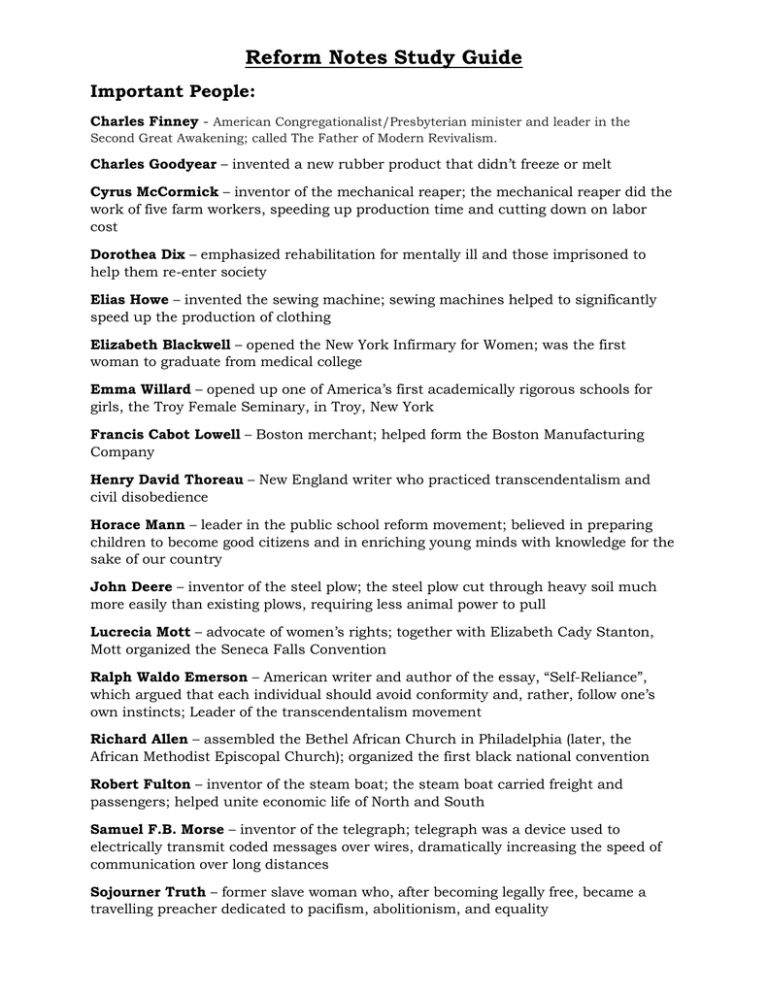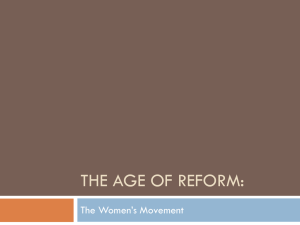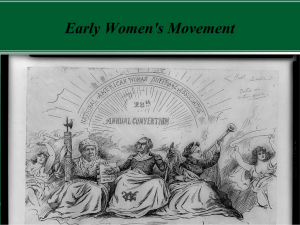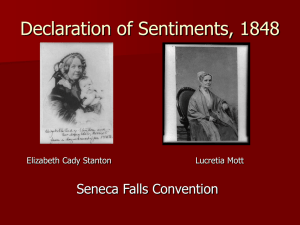Reform Notes Study Guide Important People: Charles Finney
advertisement

Reform Notes Study Guide Important People: Charles Finney - American Congregationalist/Presbyterian minister and leader in the Second Great Awakening; called The Father of Modern Revivalism. Charles Goodyear – invented a new rubber product that didn’t freeze or melt Cyrus McCormick – inventor of the mechanical reaper; the mechanical reaper did the work of five farm workers, speeding up production time and cutting down on labor cost Dorothea Dix – emphasized rehabilitation for mentally ill and those imprisoned to help them re-enter society Elias Howe – invented the sewing machine; sewing machines helped to significantly speed up the production of clothing Elizabeth Blackwell – opened the New York Infirmary for Women; was the first woman to graduate from medical college Emma Willard – opened up one of America’s first academically rigorous schools for girls, the Troy Female Seminary, in Troy, New York Francis Cabot Lowell – Boston merchant; helped form the Boston Manufacturing Company Henry David Thoreau – New England writer who practiced transcendentalism and civil disobedience Horace Mann – leader in the public school reform movement; believed in preparing children to become good citizens and in enriching young minds with knowledge for the sake of our country John Deere – inventor of the steel plow; the steel plow cut through heavy soil much more easily than existing plows, requiring less animal power to pull Lucrecia Mott – advocate of women’s rights; together with Elizabeth Cady Stanton, Mott organized the Seneca Falls Convention Ralph Waldo Emerson – American writer and author of the essay, “Self-Reliance”, which argued that each individual should avoid conformity and, rather, follow one’s own instincts; Leader of the transcendentalism movement Richard Allen – assembled the Bethel African Church in Philadelphia (later, the African Methodist Episcopal Church); organized the first black national convention Robert Fulton – inventor of the steam boat; the steam boat carried freight and passengers; helped unite economic life of North and South Samuel F.B. Morse – inventor of the telegraph; telegraph was a device used to electrically transmit coded messages over wires, dramatically increasing the speed of communication over long distances Sojourner Truth – former slave woman who, after becoming legally free, became a travelling preacher dedicated to pacifism, abolitionism, and equality Terms to Know: “Cult of domesticity” – based on prevailing customs, the “cult of domesticity” was the belief that women should stay at home, as servants to their family, and to not do any work outside of the home. “Mill Girls” - female workers who worked in the textile factories in Lowell, Massachusetts; most workers in textile factories were young women Apprentice – a worker learning a trade or craft, typically under the supervision of a master Civil disobedience – refusal to obey laws which are seen as unjust; effort to change government policy using peaceful resistance Commonwealth -v- Hunt - Massachusetts Supreme Judicial Court ruling on the subject of labor unions; established that workers had the right to form unions; Chief Justice Lemuel Shaw ruled on the case Cottage Industry – business or manufacturing activity carried out in a person’s home Erie Canal – a canal in New York running from Albany to Buffalo, designed to create a water route from the Atlantic Ocean to the Great Lakes Journeyman – skilled worker employed by a master Master- skilled artisan; often owns a business and employs other workers Second Great Awakening – religious movement emphasizing individual responsibility for seeking salvation; emphasized need for personal and social improvement; Seneca Falls Convention – women’s rights convention held in Seneca Falls, New York Temperance movement – organized effort to prevent drinking alcoholic beverages Transcendentalism – movement that emphasized living a simple life; valued truth found in nature, personal emotion and imagination


